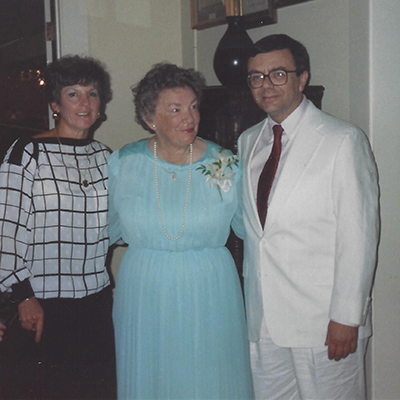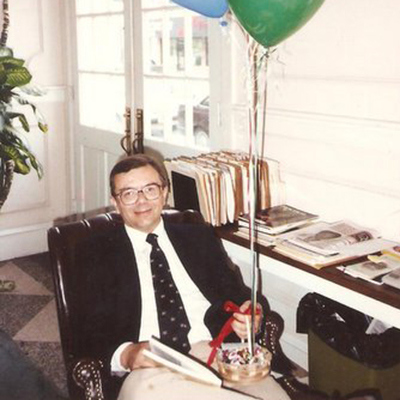
An Interview with Clifford Leblanc - A JMB Employee
This interview took place with Clifford LeBlanc in March 2013 at Galatoire's Bistro in Baton Rouge, La. Gertrude and Dale Pfost conducted the interview; it was recorded and edited for brevity. Cliff's wife Cacky was also present.


Gertrude - Cliff, how did you end up working for the Burguières?
CL - The Burguières contacted me; actually Mr. Ed Courtney contacted me. Mr. Courtney was a buddy of mine. Everybody that did this kind of work was old, but I like old people, so that wasn't a problem for me. Mr. Courtney ran a company that owned a lot of property in the Atchafalaya basin. Before I came to you all, I was doing oil and gas leasing out of my house. I didn't leave the state of Louisiana. I sort of had a clientele. If people had a pipeline going through the Atchafalaya basin, they would call me because I knew all these owners and had a good working relationship with them. Mr. Courtney was known as a particularly difficult person, but he and I hit it off right away. He was a good friend. The Millings knew Mr. Courtney and they represented the Burguières, so I guess they called Mr. Courtney and told him that the Burguières didn't know anything. They didn't know what they had.
Mr. Courtney told me that if he was 20 to 30 years younger, he would take the job and he said to me, "You should take the job." He had agreed to a salary and everything. I was already doing my own business and making pretty good with it. He told me, "Keep your business." I told him to talk to them and tell them that this was a big point.
I went to a meeting somewhere in New Orleans with Mr. Courtney and we walked in the room and there were all these young guys, guys younger than me, like Sam and Pepper. I was like, "What is going on here, why are they calling me; they have all these young guys." When we left, I said to Mr. Courtney, "What is going on here? They want me to come in and organize everything and then they're going to fire me?" He told me not to worry about it and he encouraged me to take the job. It was about 1980.
I think Ed Burguières was the one that was running the company before I was hired. I never met him, but I did meet his wife, his second wife. Everything was a mess. Hard to believe you owned this property for so many years and didn't even have a map. When I got there, there was no office, no maps, and no paperwork. There was nothing! Sam, your dad, took me to see the property, but he didn't know. It was all laissez faire. They kind of let everything go. I had to start from scratch. The very first issue was they wanted me to see about a lease with Exxon. I asked, "Is it open?" They said, "What does that mean?" I told them it meant do you have it leased already. They didn't even know. In fact, it was already leased. I remember, someone said to me, "You mean you know how to do that?" Well, I grew up on our Plantation in White Castle. As a kid I knew where everything was. The big house was taken down in the 50's; it was a huge Victorian raised cottage. My great grandmother had died there.
Anyway, all the papers and stuff were being stored in New Orleans. So I had to hire a mover. I hired my old buddy from Plaquemines, a black gentleman who did all our family moves. I called him up and asked him if he'd go to New Orleans and pick all this stuff up. He talked about that until the day he died. He brought back so much stuff. I had rented this big old house in Franklin; it was the only thing available at the time; there was a boom going on. Everything was taken but this great big house on Main Street. I was able to get this house as a place for me to live and an office and it had a place in the back, three big double garages. They brought this stuff from New Orleans and it filled those three garages floor to ceiling. So I hired a person to sift through all of the letters and correspondence. It took that girl three years. I also hired a court house girl to pick up any documents that had anything to do with the Burguières. So we were able to create files that way. I was able to get a jump start on what was leased. Then I went to Lafayette and had maps made that I could use. I had them converted to little booklets that I could carry with me, showing essential things, like where the borders were and who was the farmer. I put it together. It took a while but it was fun.
Dale - Who did you report to?
CL - - I was reporting to Philip and Ron. There was so much hostility. I wasn't allowed to speak to anybody that wasn't on the Board for a long time. Eventually I got that settled down. They were scared to death of Gregory, and Barat was paranoid about a lot of stuff. I guess she had reason to be.
Gertrude - Did you go to the JMB board meetings?
CL - Sure I went to board meetings; I was the board meeting. I had to present everything. I started to figure out what they should know about the Company. The meetings were usually at the Millings office in New Orleans. I went to New Orleans so much in those first few years that I won a ticket to go to England. Originally I stayed at these real cheap places. Then here come a couple of these board members staying at the best hotels in town, so I found a more convenient hotel. I stayed at the Intercontinental and I was there so much they got to know me; it was like a second home. I was 35 at the time, I'm 68 now. Not sure how old Philip and Ron were then. You know what your dad asked me about Franklin? He asked, "You mean you'd live there?" Barat asked me if Franklin had grocery stores. Well, you know the New Orleans attitude about anything outside of New Orleans. They lucked out when they got me. I don't mean because I'm wonderful, but I just happened to have all the qualities that were needed for that job. They didn't know what qualities they needed, but it was simply that Mr. Courtney said to hire me, so they did. It was the luck of the draw.
Gertrude - Did you go to the shareholder meetings?
CL - Sure, I ran those meetings. I was the one that had to do all the work, plan the meeting and the lunch. Usually they were at the Pontchatrain Hotel in those days; that's what they liked.
Dale - How many employees were there?
CL - I had to train Debi; she was only 23 years old, if that old, at the time. She had a high school education and was working in a flower shop. I went through about seven people before Debi, and Cambre was getting a little nervous. I wanted to find the right person. It was tough going in the beginning. But I could see the things that were needed, besides organization, things that would make people confident that the Company was in good shape. So eventually, I started the family tree and I had a book on the counter and I encouraged people to come by the office if they were in town. I started collecting pictures. I'd ask people to share pictures of the older people. People didn't know what JMB looked like, and we had pictures of J. M. Burguières and his wife in books for people to see. I kept trying to have a good relationship with all the stockholders. There were about 100 of them. I don't know how many there are now. Well I befriended as many as I could.
We had property in Houma, so I'd go to Houma every so often and I became friendly with Bobby and Linda. I'm sure I went to everyone's house. They were glad to know me. I treated everybody the same way. It was very bitter before I got there. I did meet Uncle Pat and his wife. They were something else. Barat and I had a mutual acquaintance, one of her children was married into the Percy Lathrop family, and she knew some of my relatives in New Orleans, too. We became friends. Eventually I'd go have a few little meetings out of town, like Washington, and get Kiki and your brother Tom to come.
I thought your mother was a fine person, a real brick. I mean, you know it was her income. I think she was smarter than your dad. She hid that pretty well, and she used her feminine and southern ways to get him to see things. She also took care of your uncles Bunny and Henry. All these people tried to help me understand. Henry Pierson was really nice to me, in fact, Henry got mad at them when they let me go. Some of them were very petty. I got in trouble a few times with the Burguières. I was doing fine. Ron tried to make me a 9 to 5 person. But I was not a 9 to 5 person; I couldn't stay in an office. So I'd go out. Ernest was about as flamboyant and wild as anybody you would meet. You know he lived in Nicaragua and was good friends with Somoza. Ernest and Patout used to fight all the time. When Ernest died, he wanted to be buried in the old tomb out at Cypremort. You know Patout was not dead, but he had put his name on the headstone already. So Virginea buried Ernest on the side of the tomb; she didn't want him mixed up with Patout.
Gertrude - What would you say was your biggest accomplishment with the Burguières Company?
CL - I'd say my biggest accomplishment was getting it organized and running like it should. They didn't always listen to what I said, of course. You know I increased all the income by about 20% within a couple of years of being there. They were not getting all the money they should have from the crops or from the salt mine. I became very close to Taylor Caffery. We started having an audit once a year. Domtar, really the Canadian government, was running the mine at the time. Taylor and I would fly up to Toronto and meet with the accountant who did the audit, the same accounting firm that we used here, but their office in Toronto. Within a year or so revenue was up by 22%. It was a bookkeeping thing, bookkeeping errors. Sometimes they went behind my back and undid things.
The Board was scared to death of the farmers. They thought that if a farmer left, they'd never get another one. This is something you have to grow up with. My dad was a farmer and I knew how it all worked. At the time Billy Patout was a stockholder. It was so funny; he tried to boss me around when I was first there. He was a piece of cake. They hated him. Philip's aunt, Mrs. Verbeck, who lived in Natchez, had sold her shares to M.A. Patout. They went into orbit over that. You couldn't stop people from selling what they had. But I think, she was old, and she didn't have any children and the Company looked like it was going to fall apart. So she had the chance to sell at a good price. I'm sure she didn't sell it lightly. She might have offered it back to them and they didn't take it.
I got to know Billy and his dad, Mr. William. They were so nervous about him and didn't want me to have anything to do with him. He wanted to know about sensitive information, but he didn't own enough to demand it. He would sometimes go to shareholder meetings. Eventually he sold his stock back. I know Philip ended up with 10% of the Company. I always found it interesting and nice that Philip and Ron were that interested in the Company. Once when I first met your dad and he was driving me around the property, I asked him, "How long do you think it's going to take me to get this business straight?" I figured after I get it straight, I'd be a gone pecan. He said maybe ten years. Well, they got rid of me after the 11th year. They never wanted to pay me. When they hired me, Ron told me they were going to pay me $2,000 a month, and then after 6 months, if you can do the job we're going to raise it to $3,000 a month and then they'd raise it to $4,000 a month. Well, they never raised it. If I didn't like what I was doing, well I guess I would have to quit. I had to make a lot of decisions and I had to sell my house. I just let all that go. I learned a lot from Philip and Ron. I'd see them all the time; I was at their beck and call. I was hesitant at first; I didn't want to offend them. And it took them a while to give me authority. It worked out.
One of the bigger disappointments was when the Oaklawn sugarhouse was purchased by those people from Arkansas. They came to me because they wanted our cane; we had 60,000 tons of cane per year. That's a big amount. The Company had never tried to negotiate any kind of deal with any sugarhouse. So, I made a contract with Oaklawn. Oh, Mr. Patout was about to die he was so upset. He brought me to New Orleans to talk to me and beg me and threaten me. He wanted that cane. Anyway, I didn't trust Billy. I knew he would steal. Oaklawn was a good contract; it was the only written contract in the state with the farmers and sugarhouse. One of the farmers, Joel Luke, didn't like it at all. But they let him out of the contract.
Dale - Did the company pay dividends?
CL - Yes, that was my job. It was very important. Most of the money was paid out as dividends.
When I got there, when you crossed the bridge at Cypremort, there were all these low-rent little houses across the canal. The people had built those houses; we just owned the property. Your daddy hated those houses out there, and he wanted me to get rid of them. Every year the Milling firm would draw up new leases, and of course the bill from the Milling firm was way more than the rent from these houses. So I went to New Orleans for several weeks and we drew up forms for leases, and we did not need lawyers to draw up leases. Eventually I had to get rid of those people and they moved their houses away. Dozens of little things had to be done; there was some hostility. By the time I left, we had an office and leases and we could tell you what was going on with the property for as long as you owned it.
Gertrude - What was it like out at Cypremort?
CL - It was fun. It was a lovely house. Cacky and I lived there for a few years till they fired me in 1992. We moved to New Iberia for a few years, then to Lafayette where I had an office and then here to Baton Rouge, where my mother lived, and I did real estate work and tended to my mother. I'll tell you a story. The first pipeline people I worked with, when they came to pay me, they brought a check and asked me how much was for me. I think maybe Ed was in the habit of ... you know. I thought that was funny. Once I turned that guy away, no other companies came to me that way. People didn't know who the Burguières were out there. Who is running the whole thing now?
Dale - Ron's daughter, Susanne, is the chairman. And a President and General Manager was hired, Glenn Vice.
CL - The first thing they told me was, "You will never be on the Board and you will never be an officer of this Company."


